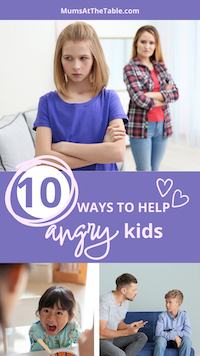We explore the different reactions angry kids may exhibit, the common reasons why they get angry and practical tips to help manage their emotions.
Anger is a tricky emotion. While it’s often labelled as toxic due to its shadow side of violence, aggression and intimidation, anger is a perfectly normal and healthy emotion when expressed safely and respectfully.
Managing our kids’ angry outbursts and strong emotions can be a challenging task for parents. Many young children struggle with impulse control, leading to angry behaviour that can escalate into behavioural problems if left unaddressed.
As parents, understanding the reasons behind a child’s anger and learning effective ways to help them can make a significant difference in their emotional regulation, overall mental health development and maturation.
How angry kids express their emotions
Angry feelings manifest differently depending on the child’s age, personality and coping mechanisms. Here are some common reactions observed in both young kids and older children:
Aggressive behaviour
- Hitting, biting or pushing to communicate they are upset.
- Verbal aggression, such as yelling or name-calling, as a way of communicating to the person who upset them that they are hurt.
Withdrawing
- Some kids retreat to a safe place when angry, avoiding family members or peers.
- They may appear sulky, refuse to engage or communicate, or use the “silent treatment” on others.
Crying or tantrums
- Younger kids often cry or throw tantrums because they lack the language to articulate their big feelings.
Extreme anger outbursts
- These can include throwing objects, slamming doors or other destructive behaviours.
Passive-aggressiveness
- Older children might show anger in indirect ways, such as ignoring instructions or being uncooperative.
Anxiety, depression or suicidal thoughts
- Children who are unable to find solutions or a healthy outlet for their anger often begin to experience anxiety, depression or even contemplate ending their own life due to feelings of hopelessness.
Common reasons behind a child’s anger
There is a quote which says, “I saw with my anger long enough until she told me her real name was Grief.”
When negative experiences happen to a child without any foreseeable positive outcomes, the big complex emotions like sadness and fear can express themselves as anger. While not all angry outbursts mean your child is grieving (they might be hungry or tired), if your child has severe and consistent anger issues, there is a very real and potentially serious issue with their environment.
Angry kids often experience a combination of underlying causes that fuel their frustration. Here are some common ones:
Family dynamics
Witnessing an angry parent or ongoing conflicts among family members can contribute to a child’s angry behaviour. If unhealthy anger is being expressed by adults, the child will assume this is normal and how one communicates. Unrealistic expectations on kids can fuel anger, as they feel powerless, inadequate and not good enough. If parents overlook or neglect their kids, or there is a strong sibling rivalry dynamic, this can increase resentment, leading to anger.
Unmet needs
Hunger, fatigue or overstimulation can lead to anger outbursts, especially in young children. If a child feels unsafe at home or school, this can lead to explosive anger building up.
Unresolved trauma
Past experiences, such as neglect, abuse or loss, can manifest as anger issues due to being unjustly victimised and struggling to believe anyone really loves or cares about them.
Low self-esteem
Kids who doubt their abilities or feel unworthy might express their internal struggles through anger.
Lack of consistent consequences
Inconsistent discipline can confuse kids, making it harder to understand boundaries and control their impulses.
Difficulty expressing feelings
A child’s anger may arise from frustration when they cannot communicate their needs effectively. This can be especially challenging if a child has a learning disorder.
Sensory overload
Loud noises, bright lights or crowded environments can overwhelm children with sensory sensitivities and trigger anger outbursts.
Health issues
Learning difficulties, sleep disorders or chronic conditions can increase irritability and anger.
Exposure to violence on media
Watching aggressive or violent behaviour, whether at home, school or on the TV, can influence children to mimic similar angry behaviours.
High-sugar diet
A diet high in sugar and processed foods directly affects a child’s mood, leading to them getting “hangry” due to spikes in blood sugar and withdrawals from addictive food substances. Processed foods often have chemical sweeteners or ingredients that can affect brain function, leading to poor decisions and low impulse control or, simply put, a huge allergen load on the body, leading to high levels of fatigue and feelings of frustration.
Healthy ways to help angry kids
Helping a child navigate their anger isn’t about suppressing the emotion but teaching them how to express it constructively. Below are effective strategies to help:
1. Address underlying causes
Seek to understand what the issues are that are fuelling your child’s behaviour.
- Are they being left alone for long periods before and after school, with very little connection from you outside of negative attention?
- Are they feeling sad and scared by people at home or school and not being validated or offered solutions of fairness and justice?
- Have they been abandoned by a parent who suffered abuse or trauma without any help to process the pain and grief?
- Are they regularly exposed to aggressive behaviour, shouting or violence?
- Are they constantly having meltdowns during the day because the foods they are eating are not sustaining them, leading to energy slumps and cycles of sugar-binging?
While addressing the underlying causes of a child’s anger may feel difficult, it is the most effective way to manage their anger and support them in the long-term.
2. Be a good example
Kids learn by observing their parents. If they see an angry parent managing their emotions calmly, they’re more likely to mimic that behaviour. The way parents and close family members deal with anger will be the most powerful example for them.
You can help them express how they feel by saying things like, “I’m feeling very angry right now because we couldn’t go to the park. I’m going to go outside and play alone in the backyard right now because I need some time to cool down. After that, can we play a game together?”
Anger is not a bad emotion; it all depends on how you act with it. Show them it’s okay to be angry, to need space and time to be alone and think, and to be angry. Let them know what the boundaries are and follow them yourself.
3. Create a safe place for expression
Encourage your child to talk about their angry feelings without fear of judgement. If they tell you how they feel or what they did wrong and you blow up at them, they will only feel more unsafe and distrusting of you, leading to increased triggers of anger.
4. Acknowledge their feelings
Validate your child’s emotions by saying things like, “I can see you’re feeling upset. Let’s work together to figure out what’s bothering you.” This approach helps them feel heard and supported. Validating their feelings and talking about it is always a good thing. While you may fear it will increase them being upset, it usually has the opposite effect. Kids feel neglected and unimportant when their feelings are ignored and disregarded, leading to anger.
5. Teach emotional regulation
Help kids name their emotions, such as sadness, frustration or disappointment, instead of just labelling everything as “anger”. Identifying their big feelings can be a good way to promote self-awareness. For younger children, having an emotions chart or poster on the wall with different facial expressions can help them identify how they are feeling.
6. Offer consistent consequences
Set clear rules about acceptable behaviour and follow through with consistent consequences. Children especially work well with a balanced and fair system. They will only feel more angry and resentful if things are unfair and unjust.
7. Provide positive attention
Sometimes, kids feel that the only way to get attention is to do something naughty. Help them avoid this by providing consistent connection with them throughout the day and celebrating the good job they do in their various tasks. Positive reinforcement can be a huge encouragement and help with undesirable behaviours.
8. Role-play real-world scenarios
Prepare kids for real-world challenges by role-playing scenarios in which they might feel frustrated or upset. This practice helps them develop coping strategies for difficult situations.
9. Encourage creative outlets
Activities like drawing, journalling or playing music can be healthy ways for kids to process their emotions.
10. Manage diet and lifestyle factors
Diet, exercise and sleep are huge factors in mood and emotion regulation. If a child has a poor diet or gets very little physical activity, they will be edgy and tense. Avoid this by providing a diet high in healthy fats, like avocado, olive oil and nuts. This will help the brain function and keep their tummies satisfied longer.
Ensure they have a palm-sized amount of protein at each meal, such as two boiled eggs or half a cup of chickpeas. Protein increases satiety after a meal and helps with brain development.
Encourage a minimum of 30 minutes of outside play or activity each day. Physical activity will help increase their happy hormones and the vitamin D they receive from sun exposure will also help keep the doldrums away.
Ensure they sleep well by having a regular bedtime in a cool and calm environment with no screens. Help them wind down before bed with good connection, talking about their day, helping them feel seen and loved before going to sleep.
When to seek professional help
While anger is normal, extreme anger or frequent angry outbursts may signal deeper issues. Here are some signs that it might be time to consult a professional:
- Your child’s anger disrupts their daily life or relationships.
- Their angry behaviour involves consistent aggression or destructive actions.
- You suspect underlying causes like anxiety, trauma or ADHD.
A clinical psychologist or counsellor can help your child learn advanced anger management techniques and identify any hidden triggers for their emotional struggles.
Angry child doesn’t equal bad child
Angry kids aren’t “bad” kids—they’re simply learning to navigate strong emotions in a complex world. Parents play a crucial role in guiding their children through this learning process. By understanding common reasons for anger, modelling healthy behaviour and providing consistent support, you can effectively equip your child with the tools to manage their emotions.
Teaching kids to handle anger is not just about solving immediate behaviour problems. It’s about preparing them for the real world, where emotional regulation will serve as a foundation for healthy relationships and a fulfilling life.
With patience, empathy and the right strategies, parents can turn anger challenges into opportunities for growth—for both the child and themselves.
Read next: Feelings word list (Free Printable!)
How helpful was this article?
Click on a star to rate it!
4.7 / 5. 3
Be the first to rate this post!
Adriana Wales
Related posts
Subscribe
Receive personalised articles from experts and wellness inspiration weekly!


